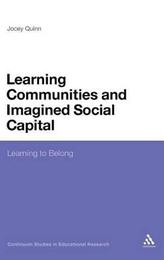
|
Learning Communities and Imagined Social Capital: Learning to Belong
Hardback
Main Details
| Title |
Learning Communities and Imagined Social Capital: Learning to Belong
|
| Authors and Contributors |
By (author) Professor Jocey Quinn
|
|
Series edited by Anthony Haynes
|
| Series | Continuum Studies in Educational Research |
|---|
| Physical Properties |
| Format:Hardback | | Pages:176 | | Dimensions(mm): Height 234,Width 156 |
|
| ISBN/Barcode |
9781847061928
|
| Classifications | Dewey:374.941 |
|---|
| Audience | | Professional & Vocational | |
|---|
|
Publishing Details |
| Publisher |
Bloomsbury Publishing PLC
|
| Imprint |
Continuum International Publishing Group Ltd.
|
| Publication Date |
1 April 2010 |
| Publication Country |
United Kingdom
|
Description
This volume critically explores themes of belonging, learning and community, drawing on a range of research studies conducted with adult learners in formal and informal contexts and employing interdisciplinary theory from education, feminist theory, cultural studies and human geography. Dominant but simplistic and regulatory ideas and practices of learning community in higher education and lifelong learning are critiqued. Instead, Jocey Quinn argues that learners gain most benefit from creating their own symbolic communities and networks, which help to produce imagined social capital. A rich variety of empirical data is used to explore and demonstrate how such imagined social capital works.
Author Biography
Jocey Quinn is Professor of Education at the University of Plymouth, UK, and former Professor at the Institute for Policy Studies in Education at London Metropolitan University, UK. She is also Visiting Professor at the University of Exeter, UK. Anthony Haynes is former Chair of the English Association schools committee, former faculty co-ordinator and mentor of PGCE students and NQTs.
Reviews'Professor Quinn brings the spirit of pleasure to an intellectually expansive analysis of belonging and the material needs of the learner. In so doing, this study takes us well beyond the common place in considering the impact of lifelong learning.' Christina Hughes, Professor of Women and Gender and Chairperson in the Department of Sociology, University of Warwick, UK 'In this important new book Jocey Quinn sets out her innovative work on imagined social capital in ways which bring alive the some 200 diverse learners who formed part of her data rich research. Through her powerful and stimulating analysis of (imagined) social capital she invites us to re-imagine educational spaces, terrains and communities, to discover the fluidity of 'belonging'. This book is a timely intervention in debates about social capital and learning communities, arguing for new ways of belonging through resistance.' Sue Jackson, Professor of Lifelong Learning and Gender, Pro-Vice-Master for Learning and Teaching and Director of the Birkbeck Institute for Lifelong Learning, Birkbeck, University of London, UK 'The author has crafted a piece that combines theory development with the voices of research informants, educationalists, sociologists, philosophers, poets and authors of modern literature. This is a readable book.' -- Widening Participation and Lifelong Learning 'Within her introduction, Quinn suggests that her aims for this book are twofold: "one is to develop generative and innovative thinking about learning, in a spirit of pleasure, the other is to pay critical attention to the needs of learners and to make a material difference in this world" (p. 2). This is an ambitious agenda, which has resulted in a challenging text: the reader's journey is not always easy, but it is always enjoyable and the rewards are worthwhile...Quinn has furnished this "shared space" in an eclectic style: the book is crammed with concepts drawn from across a range of academic disciplines, insights from poetry and fiction and a vast array of research data. Throughout, Quinn is attentive to the aesthetic qualities of the text: this is a book which Quinn has taken evident joy in the writing and which is a pleasure to read.' -- British Educational Research Journal * British Educational Research Journal * 'For me a particular strength of the book is the iconoclastic approach taken to some of the concepts that now seem ubiquitous in educational literature - particularly notions of identity, community and social capital... It is refreshing to read any academic work that does not simply tread the same old path, but which seeks to find new forms of expression - motivated not by idle preferences but by trying to find the best way of sharing particular ideas. I do not agree with all of the author's arguments and conclusions, but I do not think she expects any reader to. This is a book as dialogue.' -- Studies in Higher Education * Studies in Higher Education *
|